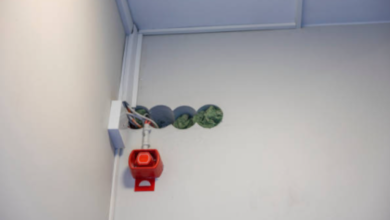Ensuring Compliance with Local Safety Regulations through Home Security
KEY TAKEAWAYS
Complying with local safety regulations is crucial for protecting your property and loved ones, and ensuring the well-being of your community. A comprehensive home security system can help you meet these regulations and avoid potential fines or penalties and even increasing your home resale value. This article will explore how home security systems can help you comply with local safety regulations.
Home Security Systems and Compliance with Burglary Prevention Regulations
Many local jurisdictions have specific regulations to reduce the risk of burglary and break-ins. Home security systems can help you meet these requirements by providing features such as secure locks, window and door sensors, and alarm systems that deter potential intruders and alert authorities in the event of a break-in.
Compliance with Fire Safety Regulations through Home Security Features
Fire safety regulations often require the installation of smoke detectors and fire alarms in residential properties. Many home security systems offer integrated fire safety features, ensuring that your home complies with local regulations and providing added protection for your property and loved ones.
Home Security and Carbon Monoxide Detection Compliance
Carbon monoxide detection is another common requirement in local safety regulations. Home security systems with integrated carbon monoxide detectors can help you meet these requirements and provide an additional layer of protection for your family against this dangerous, odorless gas.
Ensuring Compliance with Local Video Surveillance Laws
If your home security system includes video surveillance, it’s essential to ensure compliance with local laws governing the use of cameras and the recording of video footage. These laws may include restrictions on the placement of cameras and requirements for notifying neighbors or visitors of video surveillance. Be sure to consult with a professional security provider to ensure your system complies with all applicable laws.
Working with Professionals to Ensure Compliance
To ensure your home security system meets all local safety regulations, it’s crucial to work with a professional security provider familiar with your area’s requirements. They can help you design and install a system that complies with all relevant regulations and provides the protection you need.
Home Security Systems Help You Stay Compliant with Local Regulations
A comprehensive home security system can help you comply with local safety regulations and avoid potential fines or penalties. By providing features such as burglary prevention, fire safety, carbon monoxide detection, and video surveillance, a home security system ensures that your property is protected and in line with local requirements.
Don’t leave your home’s safety and compliance to chance – consult with a professional security provider to design and install a system that meets your unique needs and keeps you compliant with local regulations.
Frequently Asked Questions
-
How can a home security system help me comply with burglary prevention regulations?
A home security system can help you comply with burglary prevention regulations by protecting against unauthorized access to your home. Depending on your local regulations, your security system may need to include features such as door and window sensors, motion detectors, and alarms that can be heard inside and outside your home. By installing a home security system with these features, you can help deter burglars and comply with local burglary prevention regulations.
-
What features should my home security system include to meet fire safety regulations?
To meet fire safety regulations, your home security system should include smoke detectors connected to a monitoring service. This will ensure emergency services are notified as soon as possible during a fire. Your security system may also need to include heat sensors and carbon monoxide detectors to help detect other potential fire hazards.
-
How do home security systems help with carbon monoxide detection compliance?
Home security systems can help with carbon monoxide detection compliance by including carbon monoxide detectors connected to a monitoring service. This will ensure that emergency services are notified as soon as possible in the event of high levels of carbon monoxide in your home. Some security systems may also include features such as automatic shut-off valves for gas appliances and ventilation fans to help prevent carbon monoxide buildup.
-
What should I consider when ensuring compliance with local video surveillance laws?
When ensuring compliance with local video surveillance laws, you should consider where cameras can be placed, how long footage can be stored, and who can access the footage. You should also ensure that any signage required by local regulations is prominently displayed and that you obtain any necessary permits or licenses before installing your surveillance system.
-
How can working with a professional security provider help me ensure compliance with local safety regulations?
Working with a professional security provider can help ensure compliance with local safety regulations by providing expertise and guidance on the specific regulations that apply to your location. A professional security provider can help you identify the features and components that your security system needs to meet local regulations.
This can also ensure that your system is installed and configured correctly. Additionally, a professional security provider can provide ongoing support and maintenance to help ensure that your system remains compliant over time.
If you are interested in more articles like this, here’s one about securing your home with smart technology.





